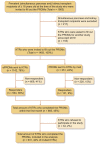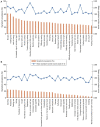Age and gender differences in symptom experience and health-related quality of life in kidney transplant recipients: a cross-sectional study
- PMID: 36708170
- PMCID: PMC10310524
- DOI: 10.1093/ndt/gfad023
Age and gender differences in symptom experience and health-related quality of life in kidney transplant recipients: a cross-sectional study
Abstract
Background: Health-related quality of life (HRQOL) is an increasingly important patient-reported outcome in kidney transplant recipients (KTRs). This study explored relationships between symptom prevalence and burden with HRQOL, and age and gender differences in symptom experience.
Methods: Eligible Dutch KTRs transplanted in Leiden University Medical Center were invited for this cross-sectional study. HRQOL, and occurrence and burden of 62 symptoms were measured using validated questionnaires. Univariate and multivariate regression analysis were used for investigating the associations of symptom experience with mental and physical HRQOL, and differences in symptom experience between genders and KTRs of diverse age groups.
Results: A total of 631 KTRs were analyzed; the mean (standard deviation) age was 61.3 (11.3) years, and 62% were male. The median (interquartile range) number of symptoms was 14 (7-22), with a burden of 20 (8-37; range 0-244). Per extra symptom, physical and mental HRQOL decreased [-0.41 (-0.50; -0.31) and -0.51 (-0.59; -0.42), respectively, P < .001]. Most occurring symptoms were bruises, tiredness, lack of energy, urge to urinate at night and dry skin. Sexual problems were considered most burdensome. Female KTRs reported more symptoms than men. Amongst others, younger KTRs experienced more (18-50 > 50-65 ≥65 years) feelings of depression and both female and younger KTRs reported higher symptom prevalence concerning changes in physical appearance.
Conclusion: KRTs' symptom experience differed depending on gender and age, highlighting the need to develop tailored treatment strategies to reduce symptom experience and subsequently improve HRQOL.
Keywords: health-related quality of life; kidney transplantation; patient-reported outcome measures; symptom experience.
© The Author(s) 2023. Published by Oxford University Press on behalf of the ERA.
Conflict of interest statement
The authors have declared no conflicts of interest. The results presented in this article have not been published previously in whole or part, except in abstract format.
Figures




Comment in
-
Health-related quality of life in kidney transplant recipients: can we do better?Nephrol Dial Transplant. 2023 Jun 30;38(7):1580-1582. doi: 10.1093/ndt/gfad060. Nephrol Dial Transplant. 2023. PMID: 37015873 No abstract available.
Similar articles
-
Understanding Health-Related Quality of Life in Kidney Transplant Recipients: The Role of Symptom Experience and Illness Perceptions.Transpl Int. 2023 Apr 13;36:10837. doi: 10.3389/ti.2023.10837. eCollection 2023. Transpl Int. 2023. PMID: 37125387 Free PMC article.
-
Quality of life for kidney transplant recipients and hemodialysis patients in Palestine: a cross-sectional study.BMC Nephrol. 2021 Jun 3;22(1):210. doi: 10.1186/s12882-021-02412-z. BMC Nephrol. 2021. PMID: 34082724 Free PMC article.
-
Proton Pump Inhibitor Use, Fatigue, and Health-Related Quality of Life in Kidney Transplant Recipients: Results From the TransplantLines Biobank and Cohort Study.Am J Kidney Dis. 2023 Aug;82(2):189-201.e1. doi: 10.1053/j.ajkd.2022.12.012. Epub 2023 Feb 18. Am J Kidney Dis. 2023. PMID: 36801431
-
Mapping health-related quality of life after kidney transplantation by group comparisons: a systematic review.Nephrol Dial Transplant. 2021 Dec 2;36(12):2327-2339. doi: 10.1093/ndt/gfab232. Nephrol Dial Transplant. 2021. PMID: 34338799 Free PMC article.
-
Symptom burden and health-related quality of life in chronic kidney disease: A global systematic review and meta-analysis.PLoS Med. 2022 Apr 6;19(4):e1003954. doi: 10.1371/journal.pmed.1003954. eCollection 2022 Apr. PLoS Med. 2022. PMID: 35385471 Free PMC article.
Cited by
-
Self-Management of Kidney Transplant Recipients Research: A Comprehensive Bibliometric Analysis.J Multidiscip Healthc. 2024 Dec 24;17:6071-6090. doi: 10.2147/JMDH.S482734. eCollection 2024. J Multidiscip Healthc. 2024. PMID: 39734796 Free PMC article. Review.
-
Fatigue across different chronic kidney disease populations: experiences and needs of patients.Clin Kidney J. 2025 Apr 18;18(5):sfaf118. doi: 10.1093/ckj/sfaf118. eCollection 2025 May. Clin Kidney J. 2025. PMID: 40599823 Free PMC article.
-
Time-dependent analysis of erectile dysfunction in kidney transplant recipients: insights from four distinct time periods.BMC Infect Dis. 2024 Jul 24;24(1):728. doi: 10.1186/s12879-024-09611-7. BMC Infect Dis. 2024. PMID: 39048969 Free PMC article.
-
The Heterogeneity of Symptom Burden and Fear of Progression Among Kidney Transplant Recipients: A Latent Class Analysis.Psychol Res Behav Manag. 2024 Mar 18;17:1205-1219. doi: 10.2147/PRBM.S454787. eCollection 2024. Psychol Res Behav Manag. 2024. PMID: 38524288 Free PMC article.
References
-
- Tonelli M, Wiebe N, Knoll Get al. . Systematic review: kidney transplantation compared with dialysis in clinically relevant outcomes. Am J Transplant 2011;11:2093–109. - PubMed
-
- Aiyegbusi OL, Kyte D, Cockwell Pet al. . A patient-centred approach to measuring quality in kidney care: patient-reported outcome measures and patient-reported experience measures. Curr Opin Nephrol Hypertens 2017;26:442–9. - PubMed
MeSH terms
Grants and funding
LinkOut - more resources
Full Text Sources
Medical

